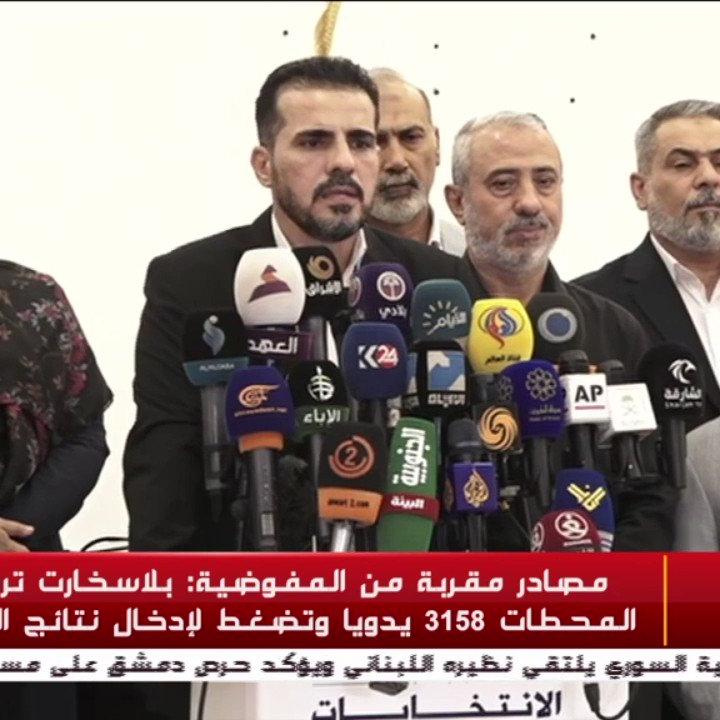
Kataib Hezbollah and the Gaza Crisis (Part 2): Israel's Incursion, Khamenei-Nasrallah Speeches, and Blinken's Visit

Hossein Moanes and Abu Fadak have carefully calibrated their threats, showing a multifaceted yet tightly controlled Kataib Hezbollah response.
This article piece discusses how the Hoquq political bloc of Iraqi militia Kataib Hezbollah (KH) and its leadership in the Popular Mobilization Forces (PMF) have navigated and exploited the Gaza war. Part 1 looked at how KH's paramilitary Special Operations wing spearheaded the group's messaging during the early days of the crisis.
After Israel's Ground Incursion: Moanes Speaks as Abu Ali al-Askari
Following the commencement of Israeli ground operations in Gaza on October 26-27, all Iran-backed Iraqi muqawama (resistance) factions issued statements, but this time KH was the first major armed group to respond. Using his online persona of "KH security commander Abu Ali al-Askari," Hoquq political leader Hossein Moanes committed KH to “a long exhaustion war against the enemy that lasts for years...Escalation will be gradual against the enemy and will take a wider area and stronger strikes” (Figure 1). Moanes/Askari was part of the initial cadre of KH Special Operations fighters and was detained by the United States from 2009 to 2010. Although he sits in parliament, he speaks for the group's kinetic attack core led by Abu Hussein.
Around the Khamenei and Nasrallah Speeches
As two key regional speeches on the Gaza conflict drew near—a November 1 address by Iranian Supreme Leader Ali Khamenei and another by Lebanese Hezbollah leader Hassan Nasrallah two days later—Qais al-Khazali and his militia Asaib Ahl al-Haq made sure they were the first to comment on October 30 (a typical and independent-looking move for both). The Badr Organization also spoke before Khamenei, albeit on the same day, perhaps signaling a need to be heard before other factions drowned it out. Harakat Hezbollah al-Nujaba and its affiliate Ashab al-Kahf spoke after Khamenei’s speech, politely waiting for the Supreme Leader and referencing him before declaring their intent to expel U.S. forces from Iraq.
The only KH leader to speak around this period was PMF operational commander Abu Fadak (Abdul-Aziz al-Mohammadawi), who held a meeting with all key commanders at the PMF Security Department on November 2, where he placed the PMF on high alert to support “the Palestinians and Islam.” He claimed that his decision was authorized by two sources: “We are a state, and the first thing that we follow is the Marjaia [meaning Ayatollah Ali al-Sistani]. The Marjaia is our legitimate cover, and it specifies our role. The other thing we are obligated to is the opinion of the chief in command of the armed forces and the government.’’ The ordering of his list underlines the manner in which the PMF is modeled on Iran's Islamic Revolutionary Guard Corps (IRGC)—that is, being primarily loyal to religious leadership, and then the state. KH made no public reference to Nasrallah’s speech, which may reflect the group's cool attitude toward its older sibling in Lebanon.
Ahead of Blinken’s Visit
With U.S. secretary of state Antony Blinken due to visit Iraq on November 5, Moanes again commented using the Abu Ali al-Askari persona. On November 4, he warned:
“First: The visit of Antony Blinken, the son of the Jew, the foreign minister of America if not the Zionist minister of war. His visit is not welcomed in the Iraq of Ali and Hussein (peace be upon them). If he comes, we will face it with unprecedented escalation.
Second: After the military escalation of the Islamic Resistance in Iraq this week, we will work on shutting down American interests in Iraq and disabling them in the region. That is what we will get to in the coming weeks if the incursion continues [referring to Israel's ground campaign in Gaza].
Third: As for shutting down the embassy and forbidding U.S. passport holders from entering the country, we will do it in our own [non-peaceful] way. Dealing peacefully with the murderers is cowardly and doesn’t suit the followers of Ali (peace be upon him)
Fourth: Opening the file of getting the foreign troops out at this time is a red herring and an attempt to restrain the resistance and shift the public internal opinion from Gaza. Getting those troops out is happening, without a doubt” (Figure 2).
Analytic Conclusions
KH has played a very significant role in the kinetic attack campaign on U.S. bases in Iraq and Syria since October 17, undertaking an estimated twenty-one attacks on U.S. points of presence as of this writing—over half of all known and suspected attacks. Its covert paramilitary wing, KH Special Operations, led by Abu Hussein, is back in business, demonstrating significant and ongoing access to Iranian-built drone systems such as (but not limited to) the Ababil-T (Qasef-2K).
KH is careful to keep its different facets talking independently: the Special Operations side through Abu Hussein, Jafar al-Husseini, and Moanes's Askari persona; the Hoquq bloc in parliament through Moanes in his own name; and Abu Fadak through his leadership of the PMF and many of its most sensitive organs. In this manner, KH presents all its faces: a "resistance" movement that critiques and defies the state; a parliamentary opposition bloc that hinders or influences state policies; a powerful internal entity that controls the current prime minister; and a collection of official state armed forces answering to religious and political directives, in that order.
In reality, of course, all of these faces answer to one root system: the KH Shura Council, and thereafter to the IRGC's Qods Force. With KH showing great discipline in placing all its attack claims under the "Islamic Resistance in Iraq" umbrella name since its first strike on October 17, KH is seemingly regaining its credentials as a coherent and under-control proxy force for Iran that now acts in parliament, in the PMF, and in paramilitary operations against U.S. forces.




